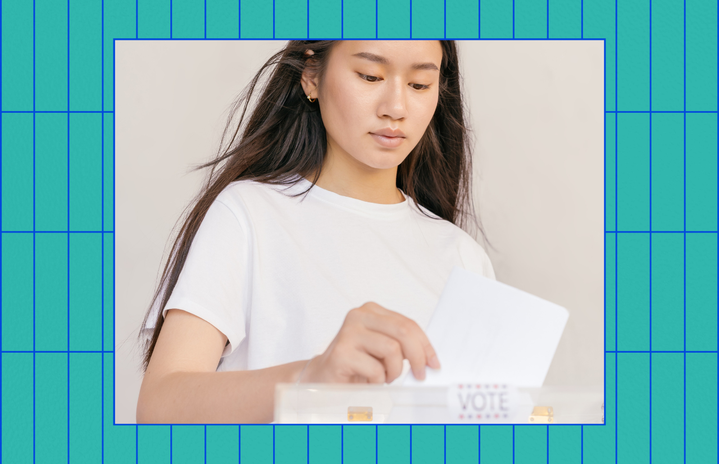UC Riverside’s campus election occurred the week of April 29th, 2024 to May 3rd, 2024. The elections are held for the student body to select their representatives in various parts of ASUCR including the Executive Cabinet, Extended Executive Cabinet, and the Legislative Branch, which is comprised of the Senators for each college within UCR. Students are able to vote online or at in-person polling sites on campus. Later in the week, the Elections Committee voted to shut down in-person polling sites in solidarity with the Students for Justice in Palestine at the University of California, Riverside and the encampment at UCR. However, students were still able to vote online via the ballots sent to their student email. Results were announced via the ASUCR Elections Committee’s instagram.
Campus elections are one of the few real ways that students can influence policy within their institutions; however, just as youth voter turnout is low in national elections, that trend seems to continue within the university system as well. In local and national elections low voter turnout has been ascribed to young adults’ apathy towards poltics and elections. However, this narrative is false. Often young voters do not cast a ballot not because they do not care about politics and civic engagement but because they do not feel represented by their options. In this way, campus elections pose a unique environment for students to feel truly represented by candidates as they are their peers, their classmates, perhaps even their friends. As such, voting in campus elections is an excellent opportunity for students.
UC Riverside’s campus elections’ website outlines voter turnout from 2001 until 2024. In 2001, 2,952 out of 12,191 students voted; only 24% of the student population. More than 20 years on and that number has decreased with only 2,824 students out of 22,824 students in total. This was only 12.76% of the student population. Overall, enrollment has steadily increased, yet voter turnout at UCR has been inconsistent and unpredictable. Interestingly, during intense national elections voter turnout at UCR increased. In 2016, a divisive and intense election season with Donald Trump and Hillary Clinton vying for the presidency on the national level, 31.5% or 5,470 students voted in UCR’s elections. In 2019, leading up to the 2020 presidential election, voter turnout was also up at UCR. 4,816 students out of 19,907 students voted.
This year’s elections showed a significantly low number of students who voted, but those who did believed voting was their way of making UC Riverside a better place. Caris Hart, a third-year Public Policy major considered voting in campus elections “[her] civic duty.” Natalie Upp, a third-year English major, stated she voted “to make sure our campus reps actually have students in mind.” This is a common concern for students, whether it be in campus elections or beyond. Voters want their elected officials to have the concerns of their constituents at the core of their policy-making decisions. GG Galvan, a fourth-year Anthropology major, felt a sense of responsibility while voting, saying, “I voted with the intention and hope of electing an impactful leadership board.” Similarly, Grace Hernandez, a first year Economics major voted because she “wanted to make a tangible impact with a vote that affects the entire student body.” These sentiments reflect that students care deeply about being civically engaged and understand the importance of voting whether it be in campus elections or otherwise. The challenge is reaching students who do not vote. Jose Tapia, a second-year Biology major, said he did not vote because “I didn’t know any of the candidates or what changes they wanted to make.” Marketing campus elections is an ongoing struggle. In most cases students are aware elections are happening but do not know where to access information on the candidates’ qualifications and policy goals. In the end, students would rather not vote than potentially vote for someone whose stances they do not support. Campus elections would benefit greatly from increased promotion of the elections themselves easier access to the specific goals candidates have for UCR.
Research has shown that one of the best ways to increase voter turnout is “meaningful partnerships among educators, policymakers, practitioners, and community stakeholders to prepare youth for the 2024 vote and future leadership.” Civic engagement and government classes rarely focus on voting as it pertains to the youth of today. There is much discussion about the procedures and historical facts that gave us all the right to vote, but today’s youth need meaningful conversations regarding why voting is important. Parents can also play a crucial role in explaining the importance of voting to their children especially since “voting is a habit formed over time.” My own parents took me to vote with them for presidential elections. In doing so they helped me develop an appreciation for the democratic process that eventually translated to my own passion for voting once I was old enough.
The votes of young people are incredibly important. Gen Z and Millennials are slated to become the majority of the American electorate by the end of this decade. This population will wield extraordinary voting power, but if voter turnout trends continue with the dismal pattern they have been this power will mean nothing.


